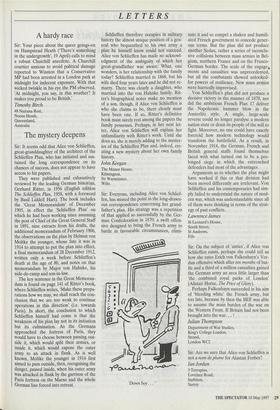Sir: Everyone, including Alice von Schlief- fen, has missed the
point in the long-drawn- out correspondence concerning her grand- father's plan. His strategy was a repetition of that applied so successfully by the Ger- man Confederation in 1870: a swift offen- sive designed to bring the French army to battle in favourable circumstances, elimi- Down boy . . . ' nate it and so compel a shaken and humili- ated French government to concede gener- ous terms. But the plan did not produce another Sedan, rather a series of inconclu- sive collisions between mass armies in Bel- gium, northern France and on the Franco- German border. The scale of the engage-, ments and casualties was unprecedented, but all the combatants showed unlooked- for powers of resilience. New mass armies were hurriedly improvised.
Von Schlieffen's plan did not produce a decisive victory in the manner of 1870, nor did the ambitious French Plan 17 deliver the Napoleonic hammer blow in the Austerlitz style. A single, large-scale reverse could no longer paralyse a modern nation state or drain its people of the will to fight. Moreover, no one could have exactly foretold how modern technology would transform the battlefield. As a result, in November 1914, the German, French and British general staffs found themselves faced with what turned out to be a pro- longed siege in which the entrenched defenders had most of the advantages.
Arguments as to whether the plan might have worked if this or that division had been moved differently are irrelevant. Von Schlieffen and his contemporaries had sim- ply failed to understand the nature of mod- ern war, which was understandable since all of them were thinking in terms of the strat- egy of past conflicts.
Lawrence James
St Leonard's House, South Street, St Andrews, Fife


































































 Previous page
Previous page